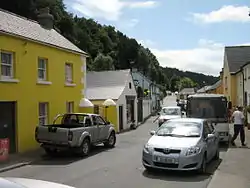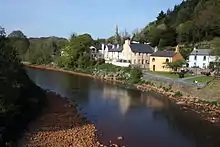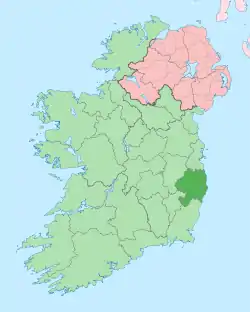Avoca, County Wicklow
Avoca (Irish: Abhóca, formerly Abhainn Mhór, meaning "the great river") is a small town near Arklow, in County Wicklow, Ireland. It is situated on the River Avoca.
Avoca
Abhóca | |
|---|---|
Town | |
 Main Street, Avoca | |
 Avoca Location in Ireland | |
| Coordinates: 52.857°N 6.215°W | |
| Country | Ireland |
| Province | Leinster |
| County | County Wicklow |
| Elevation | 35 m (115 ft) |
| Population (2016)[1] | 771 |
| Irish Grid Reference | T201801 |
The Avoca area has been associated with its copper mines for many years and the valley has been celebrated by Thomas Moore in the song "The Meeting of the Waters". The name of the song derives from the meeting of the Avonmore and Avonbeg rivers, about two miles from the village of Avoca. The song is said to have been written under a tree, the stump of which remains by the Meetings. Avoca is also famous for its handweaving, with Avoca Handweavers based there.
Avoca was once known as Newbridge. It subsequently became known as Ovoca, and then in Victorian times as Avoca. Ptolemy mentions the river Oboka on his early map of Ireland. The official name of the village is now Avoca in English and Abhóca in Irish. None of the other names are used today.
Avoca has been used as a filming location for several films and television series. The BBC series Ballykissangel was filmed there. In 1967, Avoca was one of the locations used in the film Jules Verne's Rocket to the Moon, and it was the setting for the comedy film Zonad which had a general Irish release in 2010.
The red kite, recently reintroduced to Ireland, is now commonly seen in and around Avoca.
Mining
Copper mining is reported to have begun in the Avoca River valley around 1720 and it continued, with interruptions, until 1982. Earlier mining, perhaps dating back to the Bronze Age, may have occurred. The East Avoca site, today, is composed mainly of a number of rock waste spoil heaps, abandoned quarries (Cronebane and East Avoca open pits) and disused roads. The largest spoil heap, Mount Platt, was built up from waste rock excavated from Cronebane open pit. There was a mineral tramway built from the West Avoca mines, through the village (on the opposite side of the river) and on to Arklow Harbour. The route of most of this was subsumed into the Dublin-Rosslare railway line, but an arch and a tunnel under the road from Rathdrum to Avoca remains.

Transport
Avoca lies on the R752 regional road linking Rathnew with Woodenbridge. The village is served by Bus Éireann route 133 from Dublin (66 km) and Wicklow (21 km) to Arklow (10 km), with two departures in each direction on Mondays to Saturdays and one each way on Sundays.
There has been some local political pressure[2] to reopen Avoca railway station, from which passenger services were withdrawn on 3 March 1964, almost 101 years after its opening, on the Dublin-Rosslare railway line, on 18 July 1863.[3]
International relations
Avoca has a town twinning agreement with Bromham, Wiltshire in England.[4]
References
- "Sapmap Area - Settlements - Avoca". Census 2016. Central Statistics Office. April 2016. Retrieved 28 March 2020.
- "Dick urges Council to "Get together with CIE to reopen Avoca Station"". Retrieved 1 November 2007.
- "Avoca station" (PDF). Railscot - Irish Railways. Archived (PDF) from the original on 26 September 2007. Retrieved 9 September 2007.
- "WELCOME TO BROMHAM". Bromham Wiltshire. Retrieved 7 October 2020.
External links
- Avoca Cemetery Headstones
- Mining, Metal Resources and Exploration in the Republic of Ireland in German, English summary
